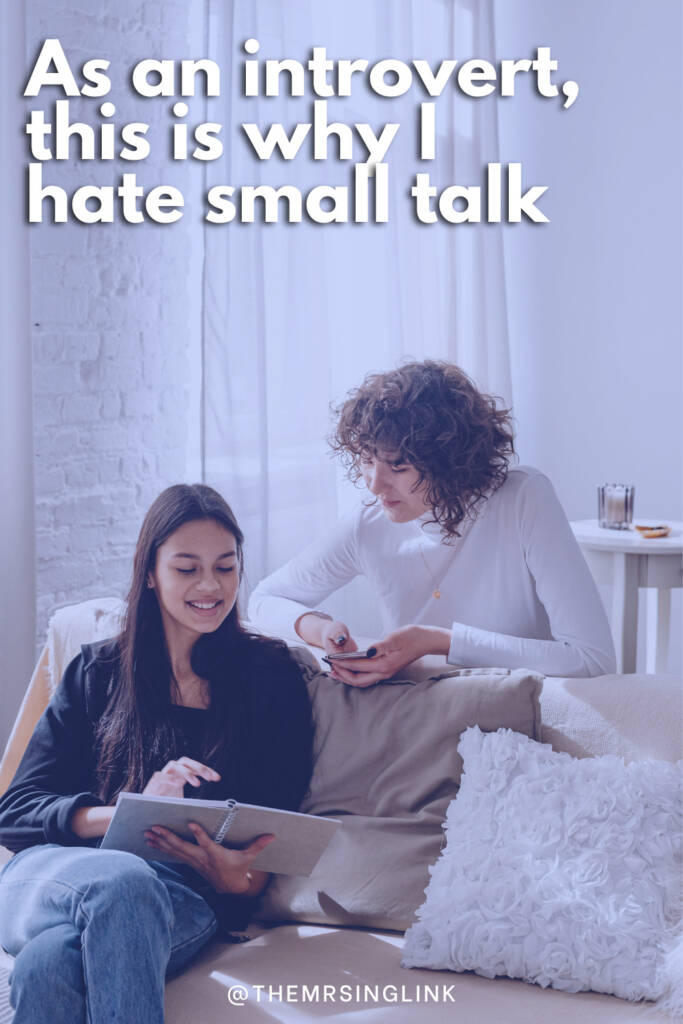As if it wasn’t like nails on a chalkboard already, meeting new people and making friends are difficult as well. But above all, introverts hate small talk. Granted, COVID (er, rather, the whole social distancing) brought us introverts a bit of relief, but this in no way means anything has changed at the forefront of our introvertedness. Even though that era has come and gone and run its course, we’re still awkward, we still prefer our alone time, and we still struggle to connect with and/or feel connected to others.
The pain of enduring small talk still resides, and for introverts this runs deep. Basically, IYKYK. This is my take on why.

This is why introverts hate small talk
Small talk = more effort
To the average person I know this doesn’t make sense. There’s really a simple explanation for why. For starters, small talk is usually more surface level, which means more topics, less substance, and shorter durations in-between. I find that those who really enjoy small talk like to cover a lot of ground, but only at the surface. I’m exhausted just thinking about that, which can often be the case for many introverts.
So that means it’s more effort (being a quite “socially anxious” individual like myself) to ensure I have enough questions to ask (to keep the conversation going) as well as knowing and [mentally] preparing for when to change topics…all in order to avoid awkward silence.
I guess you could say it’s not actually the small talk itself but the added [unnecessary] effort that is super cringy. As an introvert, it’s reached a point where I make mental bulleted lists of “small talk topics”/questions in advance on a per-person basis, like this:
- This person likes to talk about the weather (literally, like every time I see them)
- 1. Mention the heat (how unbearably hot it’s been lately this time of year and how it’s affecting my garden)
- 2. DON’T bring up the chemtrails (they don’t care; they’ll stop listening, followed by awkward silence and the abrupt change in topic)
- 3. Inquire about their thoughts on the upcoming hurricane season (they’re big “preppers”, so ask how many packs of water and batteries they have thus far)
See? More effort. Therefore, small talk can actually be more exhausting, especially when these conversations occur in loops.
Small talk [in excess] just feels so fake to me
And artificial. And impersonal. And thoughtless. And disconnected. I could go on. Though I do understand when and where small talk serves its purpose, I really do – like when meeting new people or talking to strangers. Small talk is safe because interacting with those you don’t know or don’t know very well kinda forces/helps you to tread lightly conversationally. Otherwise, obviously, there’s the risk of pushing people away.
I also understand small talk is just simply a part of usual conversation. So what I am referring to is when interactions or relationships are consumed of small talk – there’s a difference. Yet part of me is sick and tired of hearing the tug-of-war of “Just be your unapologetic self/ Just be yourself, but not ‘too much‘”. Alas, as an introvert, I struggle with feeling like I conform to others for their comfort while also taking social rejection personally. So I guess you could say I tolerate small talk (for others) which likely drives me to hating it more.
Therefore, at some point, I feel small talk should be the catalyst to a connection (something beyond small talk). And if not, I start to question the authenticity of not only the interactions but also the person and my relationship with them. Bing-botta-boom.
Small talk is my indicator for lack of or stagnant growth
Whether it is with someone new or pertaining to my more meaningful/long-term connections, friendships, and relationships. Yep, I said it. Because if a ship ain’t sailing then it’s docked at port (and going nowhere). Sure, some may be totally cool with that, and quite frankly will admit they have these types of interactions in their life by the bucket full. These are called what they are – they’re acquaintances – while many are often labeled as friends. Friends, to me, are those who have surpassed [disproportionate] interactions of small talk. They are based heavily on an established foundation, which requires more. More vulnerability, openness, loyalty, compassion, empathy, emotional safety, acceptance, respect, kindness (not “niceness”, because there can be correction in kindness), and honesty. Do I think more people today avoid or fail at creating/building this kind of foundation with others? Absolutely, yes, yes, yes. Do I feel people have settled for or “normalized” surface level connections with people yet expect those foundational qualities? Yep.
I get it. Small talk can help facilitate growth, but it is not a constant (when we often treat it that way). In fact, small talk, in my eyes, can also inhibit growth.
[mailerlite_form form_id=23]Small talk has a whole other name: Voiceless
Again, for many, being considered “too much” for others is a detriment to the Self. And, honestly, introverts are [the most] often told we are too difficult, too much or not enough of something (not talkative enough…assertive enough…social enough…emotional enough). Some have even heard this at an early age and by those who they should never hear it from (parents, family, caregivers, professionals [doctors]).
So why did I rename “small talk” to Voiceless? Well, because what do the voiceless often feel?
.
Powerless.
.
.
Insignificant.
.
Small. They feel small. And they’re often told to stay small or be smaller. As a result, small becomes safe and is then believed that it’s easier (to get by, to survive) by conforming to the tiny box they were conditioned to grow in. IF/WHEN an introvert speaks up, then we’re too loud according to those who are used to our introvertedness. Can you imagine a seedling living out its life in a small black box – how it will grow, the quality of life in its conditions, or the limited potential it is confined to?
You could call it, “going along to get along“, “staying quiet to avoid conflict“, “being compliant to avoid disrupting the peace” or “being easy-going to avoid being difficult” – whichever one speaks to you.
The less I feel, the better. The less I express, the better. The less I share (my beliefs, thoughts, feelings, values, etc.), the better. The thing is…I’m an introvert, so I’m already a fairly private person. I already know what it means to K E E P to M Y S E L F – I learned this as a coping mechanism as a child. That +plus+ small talk literally amplifies “voicelessness” to a frequency that most (other than myself, and those who resonate) can’t H E A R.
At the end of the day, for me, small talk simply implies neutrality. And people often get stuck in the love for small talk because this prevents them from facing the “tough stuff” – the REAL, sometimes personal stuff. Neutrality only goes so far in benefiting both parties equally. Small talk is simply tolerating each other all the while keeping ourselves in a neutral position – we’re not ACTUALLY being ourselves, we’re actually holding back. Eventually, small talk forces one or both people to minimize or dismiss parts of who they are – sometimes to the point where they look for themselves in others, or conform to others in order to falsify a deeper connection beyond small talk.
But I’m just not about that victim mentality, being “stuck” or staying confined to this illusion of a box that others may have created for me but that I enabled myself to be there. If to no longer be voiceless means compromising or disrupting certain connections and possible connections with others, then I can rest assured that those connections weren’t designed to be in my life. So what am I saying here? I’m saying we need to call out small talk when it is a disservice or impedance to real connection. Stop tolerating and accepting surface-level interactions or connections that stunt make you feel small and insignificant.





